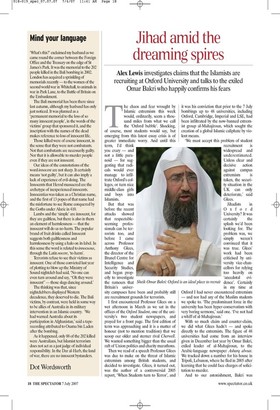Jihad amid the dreaming spires
Alex Lewis investigates claims that the Islamists are recruiting at Oxford University and talks to the exiled Omar Bakri who happily confirms his fears The chaos and fear wrought by Islamic extremism this week would, ordinarily, seem a thousand miles from what we call the 'Oxford bubble'. Shocking, of course, most students would say, but emerging from this latest essay crisis is of greater immediate worry. And until this term, I'd think you crazy — and not a little paranoid — for suggesting that radicals would ever manage to infiltrate Oxford's colleges, or turn nice middle-class girls and boys into Islamists.
But that was before the recent attacks showed that respectableseeming professionals can be terrorists too, and before I came across Professor Anthony Glees, the director of the Brunel Centre for Intelligence and Security Studies, and began properly to investigate the rumours that Britain's university campuses have been and probably still are recruitment grounds for terrorists.
I first encountered Professor Glees on a wet afternoon in March as we sat in the offices of the Oxford Student, one of the university's two student newspapers, and prayed for a front page. The first edition of term was approaching and it is a matter of honour (not to mention tradition) that we scoop our older and sterner rival Cherwell. We wanted something bigger than the usual raft of Union politics and charity marathons.
Then we read of a speech Professor Glees was due to make on the threat of Islamic extremism among British students, and decided to investigate. Glees, it turned out, was the author of a controversial 2005 report, 'When Students turn to Terror', and r it was his conviction that prior to the 7 July bombings up to 48 universities, including Oxford, Cambridge, Imperial and LSE, had been infiltrated by the now-banned extremist group al-Muhajiroun, which sought the creation of a global Islamic caliphate by violent means.
'We must accept this problem of student recruitment is widespread and underestimated. Unless clear and decisive action against campus extremism is taken, the security situation in the UK can only deteriorate,' said Glees.
Jihadists in Oxford University? It was certainly the splash we'd been looking for. The problem was, we simply weren't convinced that it was true. Glees' work had been criticised by university vice-chancellors for relying too heavily on 'anecdotal evidence'. Certainly in my time at Oxford I had never encountered extremism — and nor had any of the Muslim students we spoke to. 'The predominant force in the university has been hyper-conservatism with very boring sermons,' said one. 'I've not had a whiff of al-Muhajiroun.'
With so much claim and counter-claim, we did what Glees hadn't — and spoke directly to the extremists. The figure of 48 universities had come from an interview given in December last year by Omar Bakri, exiled leader of al-Muhajiroun, to the Arabic-language newspaper Asharq alwsat. We tracked down a number for his house in Tripoli, Lebanon, where he fled in 2005 after learning that he could face charges of solicitation to murder.
And to our astonishment, Bakri was happy to endorse everything Professor Glees had claimed. He admitted to having spoken at al-Muhajiroun meetings in Oxford University over a 14-year period, and described the University campus as the ideal place to recruit new members. 'We used to have open discussion sessions inside the Student Union,' he told us. 'We were there every Wednesday or Thursday, but we never used an Islamic name. We always had a variety of names — 'peaceful society' `shisha society', 'intellectual society'. No-one paid any attention to us. They didn't see us as extremists but as intellectual students.'
Bakri claimed to have been visiting Oxford since the 1980s, and to have spoken there during the Bosnian crisis and the first Gulf War. It fitted — in 1996 he'd told the Guardian that al-Muhajiroun planned to recruit from Oxbridge using friendly-sounding front organisations. 'They will not be able to ban peace and human societies,' he said, 'because if they do, it will only backfire!'
Not entirely convinced, we contacted Anjem Choudary, Bakri's second in command in al-Muhajiroun, and Abu Izzadeen, who has called for the Pope's assassination and described the 7 July attacks as 'completely praiseworthy'. (Izzadeen was arrested just days later under the Terrorism Act after an extensive surveillance operation.) Both men confirmed that they had visited Oxford with Omar Bakri as part of a nationwide recruitment campaign — which Bakri claimed secured up to seven converts a day. 'Sheikh Omar Bakri had many platforms around the country, and I definitely remember watching him speak in a debate in Oxford,' said Choudary.
Bakri had claimed al-Muhajiroun had the support of up to 30 Oxford students and that they regularly distributed leaflets from a street stall under the name of the `Dawah Society'. At our request, Choudary sent the leaflets to us from an email account belonging to Ahlus Sunnah wal-Jamaa'ah, a successor organisation to al-Muhajiroun. One, entitled 'The Rotten Fruits of Democracy', described paedophilia and adultery as the products of liberalism: 'Democracy and all that emanates from it is retarded and perverse. Truly the Kuffaar are upon a falsehood and what they believe in and live according to is what will make them residents of the hellfire. Do you really want to live in a society where people live like animals?'
It was chilling stuff, and certainly made for a great front page. Today, Bakri is barred from returning to the UK, and former members of al-Muhajiroun are under heavy surveillance. But are campuses still at risk from the fanaticism seen in the attacks on London and Glasgow?
This was the subject of my call to Professor Glees earlier this week. He feels the Oxford story and the events of the past week have vindicated his warnings. 'MI5 currently has 2,000 individuals under surveillance. I'd estimate there are reservoirs of 200,000 who might be up for recruitment, the majority of whom are students,' said Glees.
'Look at what Ed Hussein [author of the insider account The Islamist] says. He is very clear — Bakri's people were going up and down the campuses of this land recruiting. It makes perfect sense — targeting universities is what the communists and CND have always done and it's all fine, of course, unless you're looking to use violence to bring about political change.'
So what can be done to keep extremists off campuses? Glees wants to see tougher security and monitoring, and was furious at the University and Colleges Union's 'idiotic' rejection of the DIES proposal that lecturers report suspect students to the police. And though he's relatively happy with the government's approach, David Cameron has proved a disappointment to him `I'd say most people on the centre-right could not fail to be impressed at the success of Blair and Brown's essentially conservative approach. The government is developing sophisticated policies while distinguishing between peaceful and decent Muslims and the small group of self-declared enemies of democracy, and I think it will pay off at election time,' he said.
'But David Cameron is a different matter. There is a deafening silence from him on this. How can he be seen as a credible future PM if he cannot stand up for the liberal democratic way of life against those who hate it?'
'Even in response to the Queen's Speech last year, he suggested that there was no real security threat and that the government was using the "politics of fear" to cover up its failings. After last week's attacks, does he still believe that this is the politics of fear?'
'David Cameron has to reclaim ownership of core conservative values. What else are we fighting for? Churchill made it clear that the Battle of Britain was about a fight between parliamentary liberal democracy and totalitarian dictatorship. It's the same bottom line here. So where are the Churchills in the Tory party now?'
And where for that matter are the university dons? They should by now be taking the threat of Islamist recruiters seriously and warning students to be on their guard.




















































 Previous page
Previous page